

What are universities for? William von Humboldt did it in 1810, Cardinal Newman did it in 1852 and Lord Robbins did it in 1963.
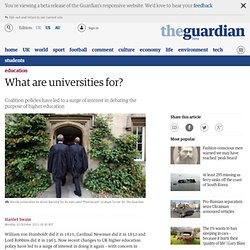
Now recent changes to UK higher education policy have led to a surge of interest in doing it again – with concern in some quarters that it is not being done enough – that is, defining what universities are for. Two events are taking place tomorrow that address the issue. A Heartbreaking Work of Staggering Wrongness. A number of former University of California chancellors met at the end of June to discuss the state of UC, and recently released a statement we linked yesterday, one called Former University of California Chancellors Urge New Funding Models for UC .
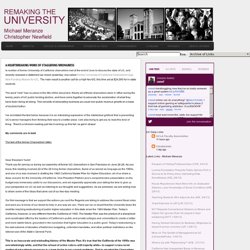
The main result is another call for a high-fee UC, this time set at $24,000 for in-state students. The word "new" has no place in the title of this document. Nearly all of these chancellors were in office during the twenty years of UC public funding decline, and have come together to advocate the acceleration of what they have been doing all along. This consists of advocating business-as-usual non-public revenue growth on a base of doubled tuition. I've annotated the text below because it is an interesting expression of the intellectual gridlock that is preventing UC's senior managers from thinking their way to a better place. Professor Stefan Collini: The Very Idea of the University. Stefan Collini reviews ‘Everything for Sale’ by Roger Brown, with Helen Carasso and ‘The Great University Gamble’ by Andrew McGettigan · LRB 24 October 2013.
It’s time for the criticism to stop.
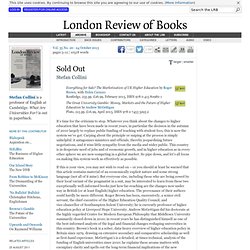
Whatever you think about the changes to higher education that have been made in recent years, in particular the decision in the autumn of 2010 largely to replace public funding of teaching with student fees, this is now the system we’ve got. Carping about the principle or sniping at the process is simply unhelpful: it antagonises ministers and officials, thereby jeopardising future negotiations, and it wins little sympathy from the media and wider public. This country is in desperate need of jobs and of economic growth, and in higher education as in every other sphere we are now competing in a global market.
So pipe down, and let’s all focus on making this system work as effectively as possible. If this is your view, you may not wish to read on – or you should at least be warned that this article contains material of an economically explicit nature and some strong language (not all of it mine). A few caveats. The place to begin may be the US Senate. VVD gunt hbo’er geen wo-titel. Reinventing Higher Education - Ie University. Speakers and attendees will include representatives from: Academic management (presidents of universities, vice-chancellors, provosts and deans) Government (ministers and secretaries of education) Business (CEOs from leading corporations) Students unions Media (higher education and innovation editors) Researchers (top scholars in the field of higher education) Chair of the conference Santiago Iñiguez, President at IE University and Dean at IE Business School.
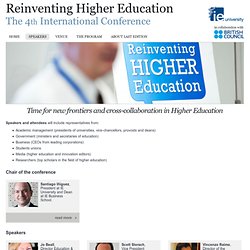
Speakers Jo Beall,Director Education & Society, British Council. Scott Slorach,Vice President Education, University of Law Vincenzo Raimo, Director of the International Office, University of Nottingham Marc Smelik,Associate Dean, External Relations, Leeds University Business School, University of Leeds. Education - The Road to Academic Excellence: The Making of World-Class Research Universities. Abstract How do you build a world-class research university from scratch?
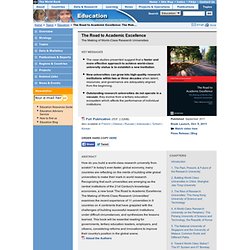
In today's ever-faster, global economy, many countries are reflecting on the merits of building elite global universities to make their mark in world research. How to build an elite research university. 10 oktober 2011 - The World Bank published a guideline on how to build elite research universities.
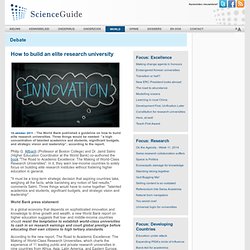
Three things would be needed: “a high concentration of talented academics and students, significant budgets, and strategic vision and leadership”, according to the report. Philip G. Altbach (Professor at Boston College) and Dr. Jamil Salmi (Higher Education Coordinator at the World Bank) co-authored the book "The Road to Academic Excellence: The Making of World-Class Research Universities".
In it, they warn low-income countries to solely focus on building elite research institutes without fostering higher education in general. "It must be a long-term strategic decision that aspiring countries take, weighing all the facts, while banishing any notion of fast results," comments Salmi. World Bank press statement. Dystopian future could await students of 2034, report warns.
Unite Group and University Alliance envisage future in which university life could be almost exclusively about training for employment University life in 2034 could have descended into a dystopian nightmare, where all students take concentration pills, campus bars have gone bust, and “experiences purely for the sake of fun are rare”, a new report on the future of higher education in the UK envisages.
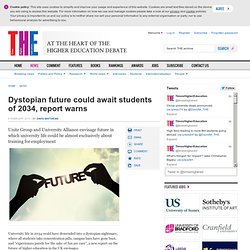
The scenario – one of four future paths for the sector put forward in Living and Learning in 2034: a Higher Education Futures Project, from student accommodation firm Unite Group and the University Alliance mission group – imagines a highly competitive society 20 years from now in which the economy has stagnated. “The student wakes with the bare minimum amount of sleep,” his eyes bloodshot, according to the scenario penned by a current student. “Focus is essential, so he starts the day by taking the concentration pills that sit by his bedside,” it continues. david.matthews@tsleducation.com.